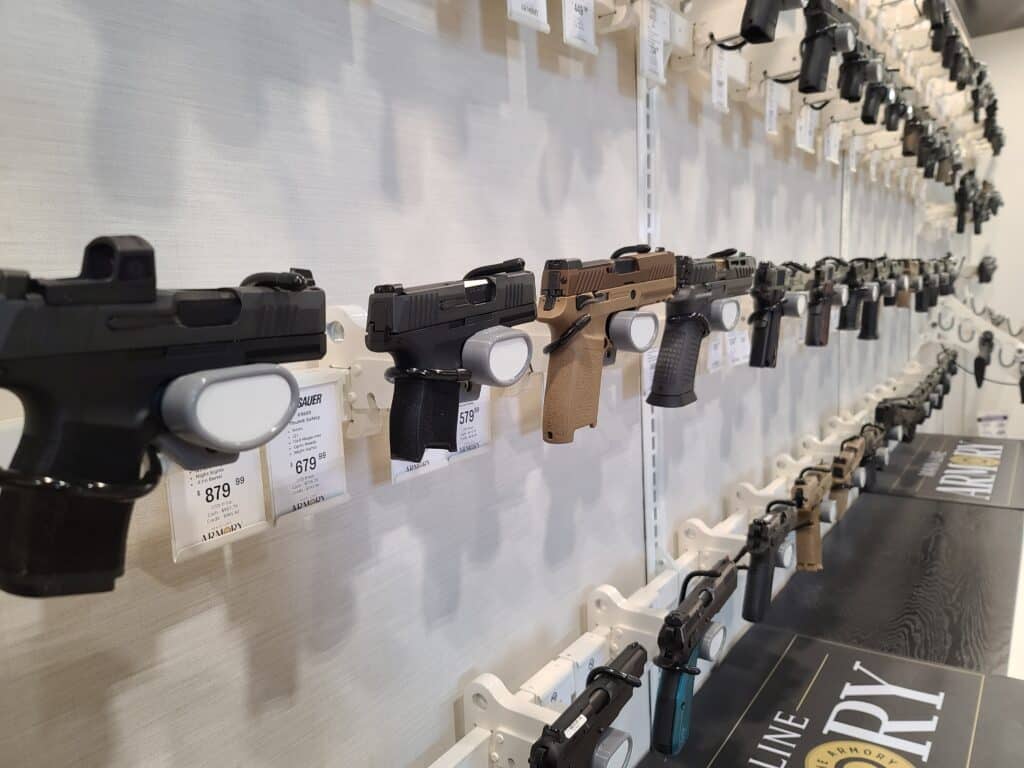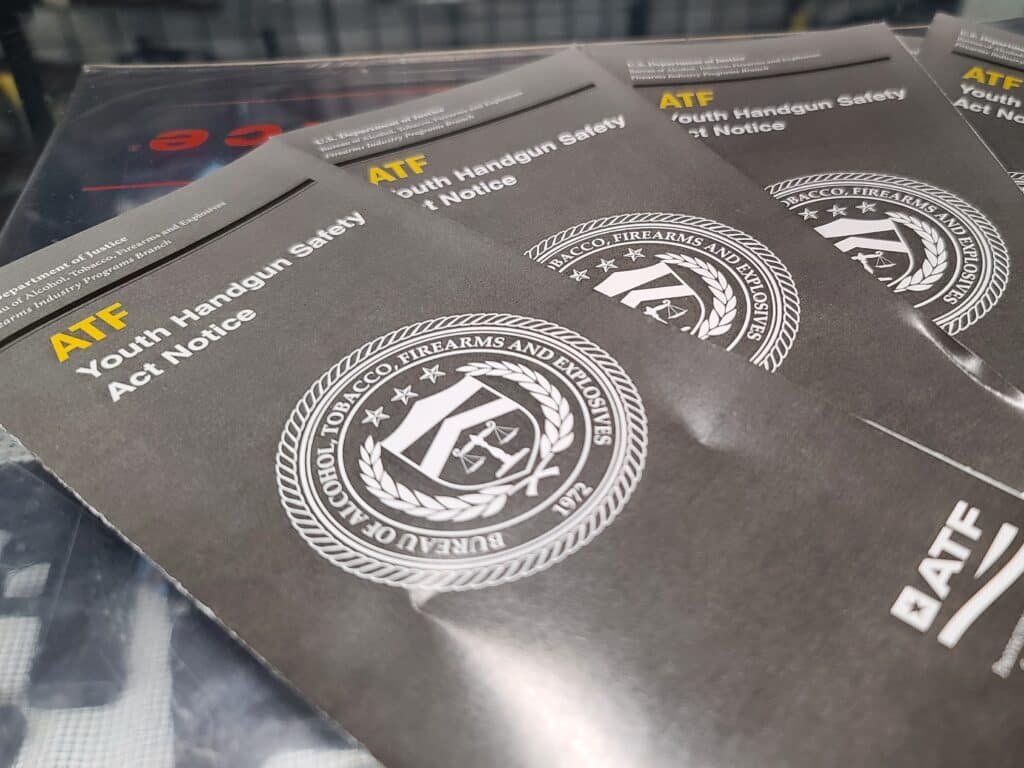When the Supreme Courtroom determined Bruen, it struck down subjective allowing but additionally appeared to okay goal allowing. A minimum of to a degree.
Contributing Author Jake Fogleman takes a have a look at the latest judicial debate over the place that time lands. He explains how a Hawaii pistol buy case led two Republican-appointed judges to disagree over the place the state’s regulation crossed the road, even when they agreed that it had.
Then, I have a look at the Trump Administration’s newest gun actions and why one ATF appointment may very well be extra significant than the rest they’ve performed to date. And Cam Edwards of Bearing Arms joins the podcast to offer his view of these strikes.
Plus, I used to be on CNN Friday to debate the Ninth Circuit’s choice upholding California’s journal limits and the video dissent that’s received everybody speaking.

Evaluation: Judges Grapple with Gun Licensing Regimes ‘Put Towards Abusive Ends’ [Member Exclusive]By Jake Fogleman
Throughout Bruen, the Supreme Courtroom implied that goal firearms licensing regimes are broadly constitutional—however solely up to a degree. A Ninth Circuit panel has new concepts for figuring out what that time is.
Final week, a three-judge panel for the appellate courtroom struck down Hawaii’s requirement that an individual purchase a handgun inside 30 days of acquiring a state-mandated buy allow. It discovered that such a brief allow validity window was “impermissibly ‘abusive.’”
“Accordingly, we affirm the district courtroom’s judgment that this side of § 134-2(e) is unconstitutional below the Second Modification,” Choose Daniel Collins wrote in Yukutake v. Lopez.
That language, deriding Hawaii’s buy allowing course of as “abusive,” is straight knowledgeable by what the Supreme Courtroom of the USA (SCOTUS) has written. Whereas SCOTUS invalidated subjective “may-issue” allowing regimes like the type previously in impact in New York, it additionally gave preliminary approval to a unique system of allowing in a much-discussed footnote of the opinion.
“To be clear, nothing in our evaluation must be interpreted to counsel the unconstitutionality of the 43 States’ ‘shall-issue’ licensing regimes, below which ‘a normal need for self-defense is enough to acquire a [permit],’” Justice Clarence Thomas wrote in Bruen. “As a result of these licensing regimes don’t require candidates to point out an atypical want for armed self-defense, they don’t essentially forestall ‘law-abiding, accountable residents’ from exercising their Second Modification proper to public carry.”
Whereas Justice Brett Kavanaugh echoed that primary level in a concurrence, no one expounded on how precisely these methods match below Bruen‘s history-based take a look at. However, some decrease courts have used that argument to broadly approve background checks and allowing necessities for each the carrying and sale of firearms.
“However no matter Bruen’s unspoken reasoning was, the Courtroom’s dicta in footnote 9 should be understood as having successfully concluded that attaching modern-day background checks to the acquisition of firearms satisfies each the ‘how’ and ‘why’ elements of Bruen’s traditionally based mostly take a look at,” Collins wrote.
Nevertheless, whereas the Excessive Courtroom didn’t absolutely clarify how allowing methods go constitutional muster, it did trace at a number of causes how these methods may nonetheless be topic to authorized challenges.
“That mentioned, as a result of any allowing scheme might be put towards abusive ends, we don’t rule out constitutional challenges to shall-issue regimes the place, for instance, prolonged wait occasions in processing license functions or exorbitant charges deny bizarre residents their proper to public carry,” Thomas wrote.
This questioning of methods “put towards abusive ends” with wait occasions, charges, or different impediments has impressed gun-rights advocates to problem elements of the “Bruen-response” legal guidelines handed in former may-issue states and localities. But neither SCOTUS nor many appellate judges have established a concrete customary for when a gun allowing system has crossed the road of being “abusive.”
Choose Collins tried to alter that in Yukutake.
Collins drew on long-established First Modification ideas for his take a look at. He mentioned the Supreme Courtroom invoked those self same ideas throughout Bruen when it used language from 1969’s Shuttlesworth case on allowing for public demonstrations, emphasizing that let issuance should be guided by “slim, goal, and particular requirements.”
“Absent additional steerage from the Courtroom, this identical strategy is acceptable right here,” Collins wrote. “Accordingly, in figuring out whether or not a selected characteristic of an otherwise-valid background-check-based allowing system is impermissibly ‘abusive,’ one ought to apply within the Second Modification context, mutatis mutandis, the identical ideas utilized in evaluating allowing methods within the First Modification context.”
He described how, in a number of circumstances, SCOTUS has beforehand held that advance allowing necessities are legitimate for a restricted vary of First Modification conduct—like marches or rallies in public areas. Nevertheless, it has discovered these necessities should meet specific constitutional necessities guarding towards “undue delays,” licensing discretion, and different burdens.
Transferring these holdings into the Second Modification context, Collins held that “a firearms allowing scheme should not ‘delegate overly broad licensing discretion to a authorities official.’”
“The relevant time frames governing the system should be ‘specified’ upfront, keep away from unreasonable and undue delays, and supply for immediate judicial evaluation,” he added. “The sensible logistical burdens on firearms possession that come up from the operation of the background-check-based allowing system—that are akin to logistical limitations on the ‘time, place, and method’ of speech—’should be narrowly tailor-made to serve a major governmental curiosity’ and finally ‘should go away open’ the complete train of Second Modification rights.”
Consequently, Collins functionally revivified a type of means-end scrutiny in Second Modification jurisprudence, however one which units a excessive bar for presidency success. It’s one which, within the Yukutake case, the state of Hawaii didn’t clear.
“The State has not carried this burden to justify its very brief temporal restrict on firearms-acquisition permits,” Collins concluded. “Whereas the State presumably has a sound curiosity in making certain that the background-check outcomes usually are not stale, the State has pointed to no proof that may assist the extravagant view that something over 10 days or 30 days counts as stale.”
It stays to be seen how influential Collins’ First Modification-inspired take a look at will probably be. It would possible be of curiosity to gun-rights advocates suing varied governments in states below the Ninth Circuit’s jurisdiction, like California, which options quite a few cities accused of charging exorbitant charges and imposing prolonged delays for issuing permits.
However it might not catch on if different judges react to it like Collins’ fellow conservative co-panelists. Choose Kenneth Lee concurred within the judgment towards Hawaii’s restrictions but additionally wrote individually to take subject with Collins’ “abusiveness” take a look at. He argued that SCOTUS would disapprove and that abusiveness must be decided by the identical history-based take a look at that Bruen requires.
“Admittedly, I’m uncertain what to make of footnote 9,” Lee wrote. “However provided that the Bruen courtroom shunned interest-balancing checks, I believe we should always—absent clear path from the Supreme Courtroom—decide ‘abusive ends’ by evaluating Hawaii’s temporal restrict in its firearms allowing regime to relevantly comparable historic analogues.”
He additionally famous the sensible issues surrounding decrease courts making use of interest-balancing checks that led SCOTUS to get rid of it within the first place.
“I’m cautious of even a restricted means-end inquiry as a result of our courtroom has a historical past and custom of whittling down the Second Modification via means-end evaluation,” he wrote.
Moreover, the Ninth Circuit’s predilection for overturning pro-Second Modification panel selections en banc hangs just like the Sword of Damocles over the novel take a look at. Because it has greater than 50 occasions, the courtroom may once more resolve to evaluation the case in full following an inevitable enchantment from Hawaii. At that time, the Collins take a look at will in all probability be vacated and changed by a brand new opinion.
Even when Collins’ “abusive ends” take a look at doesn’t catch on, it nonetheless represents one of many first vital makes an attempt to flesh out a practical customary for reviewing challenges to elements of in any other case legitimate firearm-permitting schemes. The problem gained’t be going away any time quickly.

Podcast: Bearing Arms’ Cam Edwards on Trump’s Newest Gun Strikes [Member Early Access]By Stephen Gutowski
This week, we’re a number of actions the Trump Administration simply took on gun coverage.
To wade via these strikes and navigate the place the indicators level, we’ve received Cam Edwards of Bearing Arms again on the present. We have a look at totally different tales from Well being and Human Providers (HHS), the Division of Justice (DOJ), and the Bureau of Alcohol, Tobacco, Firearms, and Explosives (ATF). As Cam famous, some had been larger offers than others.
First, HHS deleted a Biden-era report calling for brand new gun restrictions–like an “assault weapons” ban–from its web site. Cam mentioned that transfer was one properly throughout the President’s authority. He mentioned that whereas the motion arrived at a relatively gradual tempo to among the different issues the Trump Administration is doing, it mirrored what it did in shutting down the White Home Workplace of Gun Violence Prevention and will sign extra is coming within the brief time period.
Then there may be the primary rule associated to weapons from the brand new administration. The DOJ printed a plan to restart the gun rights restoration course of. Cam mentioned it was extra of a plan to make a plan, however he argued it was one other robust signal the administration plans to comply with via on promised gun rulemaking.
The ultimate improvement factors in the identical path and could be the strongest indicator of what’s to come back, in line with Cam. That’s the appointment of Robert Leider as the brand new ATF Chief Counsel. Cam argued that Leider, a Second Modification scholar and gun-rights advocate, will possible put his experience to make use of to assist enact quite a few pro-gun reforms.
You may hearken to the present in your favourite podcasting app or by clicking right here. Video of the episode can also be obtainable on our YouTube channel. An auto-generated transcript is on the market right here. Reload Members get entry on Sunday, as all the time. Everybody else can hear on Monday.
Get a 30-day free trial for a subscription to The Dispatch by clicking right here.
Plus, Contributing author Jake Fogleman and I recap the en banc Ninth Circuit’s latest choice upholding California’s ban on magazines able to holding greater than ten rounds and its much-discussed video dissent from Choose Lawrence VanDyke. We additionally discuss a separate Ninth Circuit panel’s ruling hanging down Hawaii’s distinctive restrictions on handgun gross sales. Lastly, we cowl a protracted awaited en banc Eleventh Circuit choice coping with Florida’s post-Parkland ban on gun gross sales to adults below the age of 21.
Audio right here. Video right here.

Evaluation: Trump Administration Begins Push for Gun Regulation Reforms [Member Exclusive]By Stephen Gutowski
That’s it for now.
I’ll speak to you all once more quickly.
Go Birds,Stephen GutowskiFounderThe Reload


![Analysis: How the Trump Administration Plans to Defend the Gun Ban for Weed Users at SCOTUS [Member Exclusive]](https://i2.wp.com/cdn.thereload.com/app/uploads/2025/07/IMG_5838-scaled.jpeg?w=350&resize=350,250&ssl=1)
![Podcast: What’s Going on With Virginia’s Gun Laws? (Ft. VCDL’s Philip Van Cleave) [Member Early Access]](https://i3.wp.com/cdn.thereload.com/app/uploads/2021/07/The-Podcast-Logo.png?w=350&resize=350,250&ssl=1)



![Epstein, Guns, and Sex Crimes: A Timeline [Member Exclusive]](https://i0.wp.com/cdn.thereload.com/app/uploads/2026/02/Jeffrey-Epstein-picture.png?w=350&resize=350,250&ssl=1)
![Analysis: Judges Grapple with Gun Licensing Regimes ‘Put Toward Abusive Ends’ [Member Exclusive]](https://i3.wp.com/cdn.thereload.com/app/uploads/2023/04/20230331_134903-scaled.jpg?w=75&resize=75,75&ssl=1)












